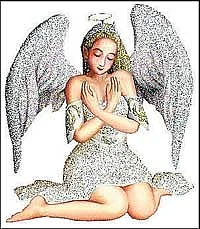
In a sleep study, a team at the Out-Of-Body Experience Research Center in Los Angeles established that religious tales of angelic encounters were nothing but a result of lucid dreams, in which one is aware that he is dreaming.
In the research, 30 volunteers were instructed to perform a series of mental steps upon waking up or becoming lucid during the night that might lead them to have out-of-body experiences culminating in perceived encounters with an angel. Half of them succeeded.
Specifically, the participants were instructed to try to replicate the biblical account in which Elijah, a prophet who awakens, sees an angel, eats food that wasn’t there before, and goes back to sleep (1 Kings 19:4-6).This event was chosen because “in terms of verifiable results, angels were the ideal choice, as Western culture provides a relatively well-established image for them (wings, white robes, halos, etc)”, lead researcher Michael Raduga was quoted as saying by LiveScience.
Fifteen of the study participants said they were able to re-create the story of Elijah during their dream-like experiences, either in part or in full. Nine of them dreamed of experiences involving both an angel and food, while the other six encountered only an angel, Raduga said.
Meanwhile, it was calculated that the statistical probability of seeing an angel as described in the Bible over the course of a lifetime is about 1 in 5,000, he said.
If he could coach people to dream a realistic religious encounter, Raduga said, he could prove that many historical accounts of such encounters — such as Elijah’s vision in the Bible — are really just products of people’s imaginations.
Though Raduga’s research was not been peer-reviewed or published, other dream experts called the findings interesting and suggestive.
“I am sure these guys are on to something,” said Allan Hobson, a professor emeritus of psychiatry at Harvard Medical School and author of several books on the neuroscience of dreaming, including “Dream Life”. The idea that religious encounters were actually vivid dreams isn’t new, he added.